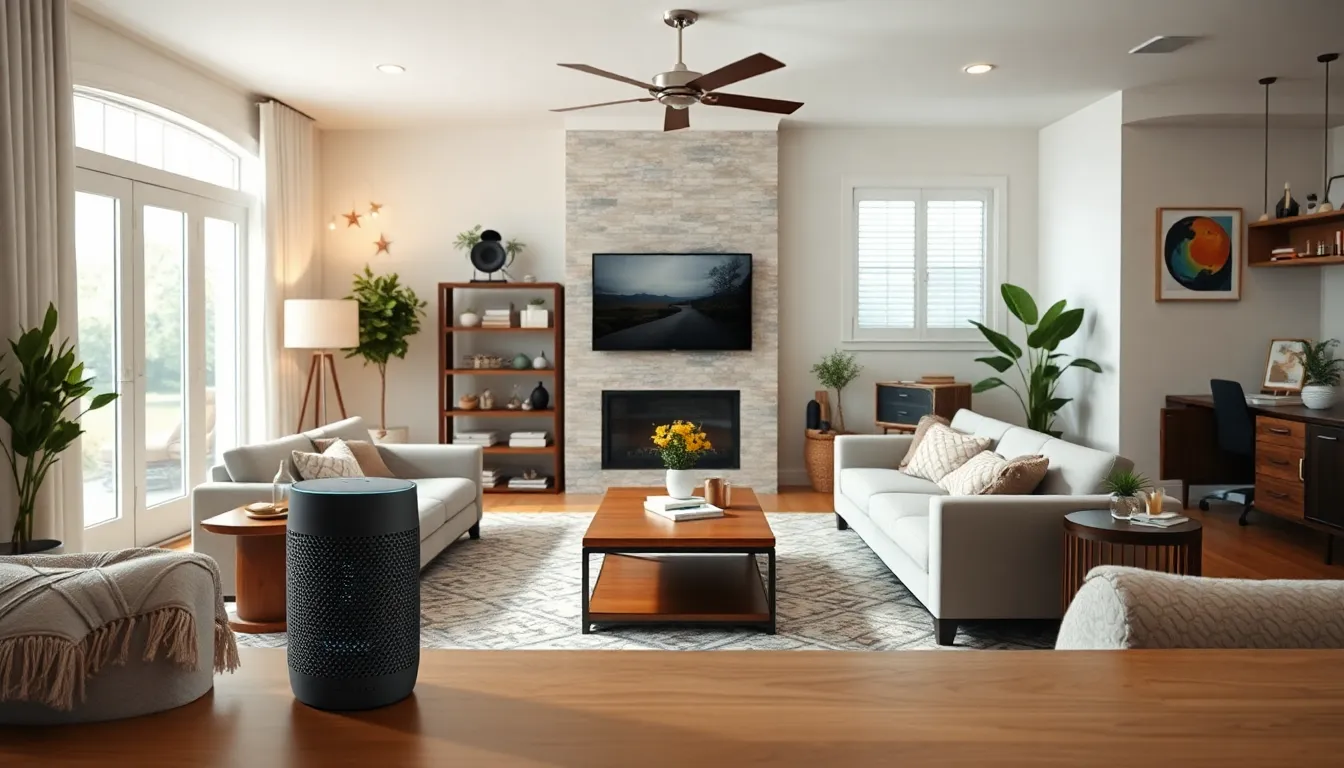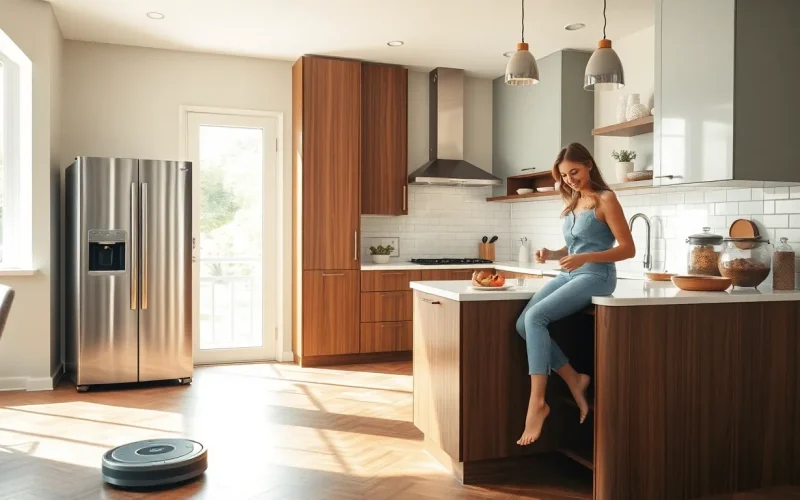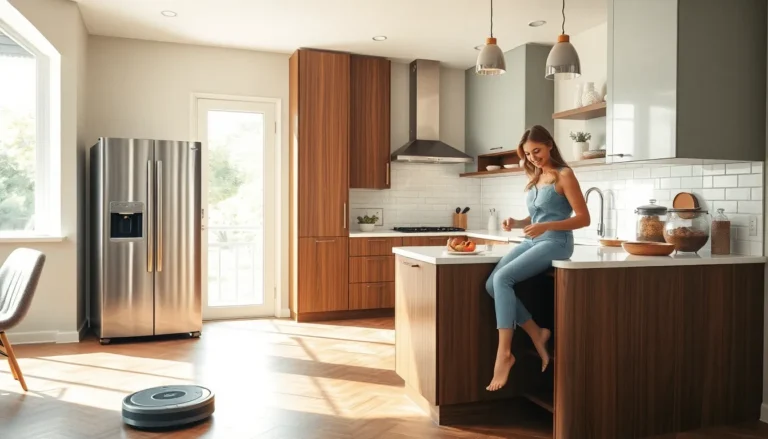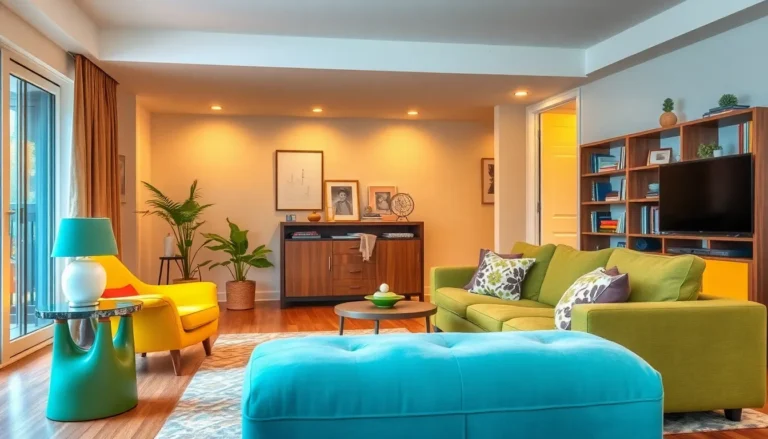Table of Contents
ToggleIn a world where smart fridges can tell you when you’re out of milk and robotic vacuums have become your new best friend, home technology trends are evolving faster than a cat can knock a glass off the table. Homeowners are no longer just looking for a cozy space; they want a connected haven that makes life easier and a bit more fun.
From voice-activated assistants that can play your favorite tunes to security systems that alert you faster than your neighbor’s gossip, the latest innovations are not just gadgets—they’re game-changers. Embracing these trends means stepping into a future where convenience meets creativity, and who wouldn’t want to live like that? Buckle up as we explore the coolest home tech trends that’ll make you wonder how you ever lived without them.
Overview of Home Technology Trends
Homeowners embrace technology that enhances convenience, efficiency, and security. Smart appliances play a pivotal role, with smart fridges and ovens optimizing meal prep. Voice-activated assistants simplify everyday tasks, allowing users to control devices with simple commands.
Robotic vacuums represent another significant advancement, enabling effortless home maintenance. These devices autonomously navigate living spaces, freeing up time for occupants. Moreover, advanced security systems provide increased peace of mind, integrating cameras and sensors with mobile access.
Sustainability trends also shape home technology, with energy-efficient devices reducing utility costs. Smart thermostats enable users to regulate heating and cooling remotely for optimal comfort. Additionally, solar panels increasingly appeal to environmentally conscious homeowners seeking energy independence.
Integration of the Internet of Things allows devices to communicate seamlessly. Smart home ecosystems create interconnected environments, enhancing user experiences and streamlining operations. Homeowners can interact with multiple devices through centralized platforms, making management intuitive.
A focus on health and wellness is evident in technology trends, with air purifiers and smart lighting systems contributing to improved well-being. These innovations address indoor air quality and optimize illumination based on activities and preferences.
As the home technology landscape evolves, trends indicate a shift toward personalized experiences. Customization options enable homeowners to tailor devices to specific lifestyle needs, promoting both functionality and aesthetics. Overall, these trends illustrate a commitment to innovation, enhancing quality of life significantly.
Smart Home Devices

Smart home devices significantly enhance the convenience and functionality of modern homes. These innovations streamline various daily tasks, ensuring a more efficient living experience.
Voice Assistants
Voice assistants serve as central hubs for smart home management. Users control numerous devices through simple voice commands, making daily routines easier. Popular options, such as Amazon Alexa and Google Assistant, integrate with various smart appliances, including lights, thermostats, and entertainment systems. Their presence in homes fosters connectivity, allowing seamless communication among devices. They also enable users to access information, manage schedules, and set reminders hands-free, contributing to an organized lifestyle.
Smart Security Systems
Smart security systems enhance home safety and peace of mind. These systems combine cameras, motion sensors, and alarms managed through smartphones. Many modern solutions offer real-time alerts, enabling homeowners to monitor activity remotely. Features like facial recognition and video storage improve security and convenience. Integrating smart locks allows for keyless entry options, enhancing user control. As technology evolves, the accessibility and affordability of smart security systems grow, appealing to more homeowners seeking reliable safety solutions.
Home Automation
Home automation transforms residences into smart spaces. Homeowners enjoy increased efficiency, convenience, and enhanced security.
Benefits of Home Automation
Streamlined living is a key benefit of home automation. Tasks become simpler with connected devices, allowing occupants to control lighting and temperature from their smartphones. Energy cost savings arise from smart thermostats that optimize usage patterns. Improved security measures come from home automation systems, which feature real-time alerts and surveillance options. Personalized environments cater to individual preferences, making daily life more enjoyable. Convenience ranks high as users can manage multiple devices seamlessly, contributing to an enhanced quality of life.
Popular Automation Systems
Several popular automation systems drive the market. Amazon Alexa acts as a central hub for managing connected devices, providing voice control for lights, locks, and more. Google Assistant integrates well with various smart devices, enhancing interconnectivity throughout homes. Apple HomeKit appeals to users seeking a user-friendly platform for automating appliances and security systems. SmartThings, from Samsung, allows extensive customization in home automation setups, ensuring compatibility with numerous third-party devices. Each system offers unique features and benefits, catering to diverse homeowner needs and preferences.
Energy Efficiency in Home Technology
Energy efficiency is a major focus in contemporary home technology. It integrates innovative solutions that significantly lower energy consumption while enhancing convenience.
Smart Thermostats
Smart thermostats transform how homeowners manage heating and cooling. They learn user preferences and adjust settings accordingly, optimizing energy use throughout the day. For example, homeowners can program schedules or access controls remotely via mobile apps. Many models contribute to energy savings by reducing consumption during peak hours, with some users reporting a decrease in utility bills by up to 30%. Brands like Nest and Ecobee offer models compatible with various HVAC systems, further increasing appeal and accessibility for homeowners.
Solar Energy Solutions
Solar energy solutions continue to gain traction among environmentally conscious homeowners. These systems harness renewable energy and can significantly reduce electricity bills over time. Installation of solar panels offers a reliable power source, decreasing reliance on traditional electricity. Various incentives, such as tax credits and rebates, make adopting solar technology more feasible financially. Moreover, combined with smart energy management systems, homeowners track energy production and consumption, maximizing efficiency and savings.
The Future of Home Technology
Transformations in home technology prioritize convenience and adaptability. Connected devices become central to daily life, enabling homeowners to create custom living environments. Smart appliances, such as fridges and ovens, enhance meal preparation by adjusting settings remotely. Voice-activated assistants streamline interactions with technology, allowing seamless control over various systems.
Integration of artificial intelligence fosters personalized user experiences. As systems learn preferences, they can anticipate needs, further simplifying tasks. Automated lighting adjusts based on occupancy and time of day, promoting energy savings while enhancing comfort. Data-driven insights drive smart security measures, ensuring homes remain safe through real-time monitoring and alerts.
Sustainability remains a major focus in the future of home technology. Smart thermostats improve energy efficiency, reducing heating and cooling costs by up to 30%. Systems that optimize energy consumption attract environmentally-conscious homeowners, while solar energy solutions continue to gain momentum. Incentives, like tax credits, promote the adoption of renewable energy sources.
Health and wellness considerations influence technological advancements, incorporating air quality monitors and purification systems. Smart lighting systems prioritize well-being by mimicking natural daylight, promoting better moods and sleep patterns. Innovations in smart homes create environments that adapt and respond to individual lifestyles and preferences.
Home automation systems integrate diverse technologies, enhancing overall convenience. Popular platforms provide compatibility and unique features catering to various homeowner needs. A connected ecosystem facilitates communication between devices, allowing for synchronized operations that enhance efficiency. Emphasis on technology that supports energy efficiency and user well-being shapes the homes of tomorrow.
The landscape of home technology is rapidly transforming as innovations continue to enhance everyday living. Homeowners are embracing smart devices that not only provide convenience but also promote sustainability and well-being. As technology evolves the integration of artificial intelligence and the Internet of Things will further personalize experiences and streamline daily tasks.
With a focus on energy efficiency and security homeowners can expect a future where their living spaces are more connected and responsive to their needs. The commitment to innovation in home technology is set to redefine how people interact with their environments ultimately improving quality of life and shaping the homes of tomorrow.





